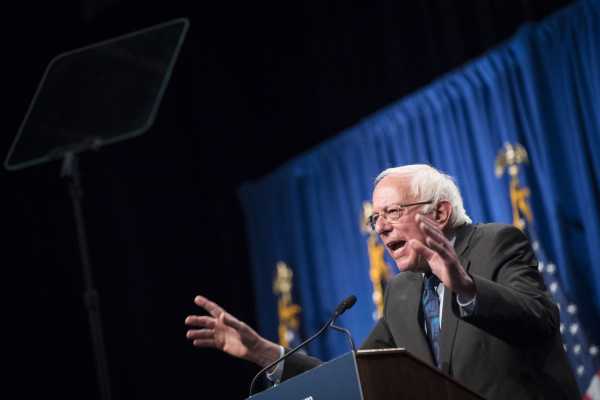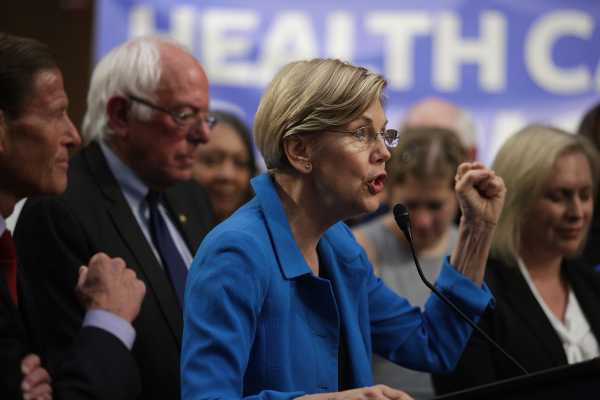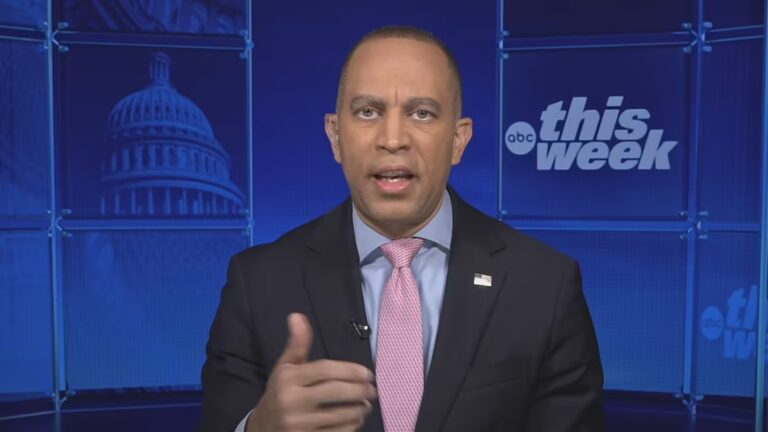
The biggest applause line in Bernie Sanders’s Wednesday speech on “democratic socialism” wasn’t actually written by Bernie Sanders. It was a quote from a 1936 speech by Franklin Delano Roosevelt, in which the then-president positioned corrupt business elites as his enemy: “They [the moneyed interests] are unanimous in their hate for me — and I welcome their hatred.”
After Sanders read that line, the audience in a George Washington University auditorium burst into a standing ovation and chants of “Bernie, Bernie.” Sanders paused and looked up from the prepared text of his speech. “I must say — it does sound a little contemporary, doesn’t it,” the senator said, grinning.
That moment revealed the essence of both Sanders’s speech and his entire candidacy.
Sanders’s embrace of the “democratic socialism” label does not mean he supports nationalizing large chunks of the American economy (as one might expect from an avowed socialist). His actual policy platform is fairly similar to self-described “capitalist” Elizabeth Warren’s, a slate of welfare state reforms that more closely resemble policies of other advanced democracies than an ambitious scheme for true socialism.
What the label signals, instead, is who Sanders is against. “Democratic socialism” in Sanders’s definition is a species of social democratic populism that pits the American people against a corrupt elite class that must be defeated outright. This emphasis on class antagonism, on the perfidies of the elite and their threat to American democracy, is what defines Sanders’s vision.
President Obama and other Democrats in his mold have tried to bridge divides between citizens, arguing that more unites than divides us. Sanders wants to emphasize a division: the split between the one percent of “oligarchs” and the remaining 99 percent of Americans. He represents a kind of class politics unusual among Democratic 2020 candidates — with the exception of Elizabeth Warren, whose speeches often hit similar themes from a less avowedly anti-capitalist perspective.
Sanders’s speech underlined the rationale for his candidacy: unadorned class warfare in the service of saving American democracy. Whether you like it or not likely plays a major role in determining how you feel about the candidate.
What Bernie Sanders’s case for himself reveals
For an address billed as a defense of “democratic socialism,” Sanders’s speech didn’t define the term all that clearly. The first attempt, more than halfway through, was too abstract to be of much use: “We must recognize that in the 21st century, in the wealthiest country in the history of the world, economic rights are human rights. That is what I mean by democratic socialism.”
It’s left to the listener, then, to figure out what exactly separates Sanders’s “democratic socialism” from what you’d hear from other liberal Democrats. It certainly isn’t policy. As my colleague Tara Golshan points out, the ideas Sanders defended in the speech are nearly identical to what you’d hear from other Democrats on the party’s left-liberal flank. Sanders deserves significant credit for that — his 2016 primary campaign really did push the party to the left — but it’s hard to make the case that there’s something distinctive about his “democratic socialism” on technocratic grounds.
Sanders’s use of FDR as a model in the speech is telling. Roosevelt, the scion of a wealthy New York political dynasty, was quite famously not a socialist; indeed, the New Deal was developed to stave off socialist sentiment in the United States, meant to tame capitalism so America’s workers wouldn’t attempt to overthrow it. Sanders chose to identify his “democratic socialism” not with any historical socialists, but with a liberal opponent of socialism.
So is there anything that makes Sanders distinctive? Or is he just another liberal Democrat with radical branding?
The answer, if you read the speech closely, is “yes.” But the difference is not about specific policies; it’s about enemies and allies. Sanders’s political vision, as given in his speech, centers on a binary between greedy oligarchs and the virtuous people who are coming together to fight them.
“In the year 2019, the United States and the rest of the world face two very different political paths,” Sanders said. He continues:
“Democratic socialism,” for Sanders, is about creating a “political revolution” that gives voice to the second group — by sticking it to the first.
Sanders’s vision is to attack the corrupt elite by getting ordinary people involved in politics. It is less a socialist wonk agenda aimed at overthrowing capitalism than it is an antagonistic theory of how politics works, founded on the socialist vision that class struggle is the fundamental engine of politics.
If we wanted to quibble about terminology, I’d say this approach is less “democratic socialist” than it is “social democratic.” But the “socialist” label is core to Sanders’s identity — both as a matter of branding and his own political past. Decades ago, Sanders used to be much more radical. In 1976, he gave an interview endorsing “the public ownership of utilities, banks, and major industries.” He has spent his life marinating in anti-capitalist political ideas and communities; his political vision and language reflect that.
This is what separates him even from Warren, whose rhetoric hits many of the same themes about the threat posed by the greedy rich and the need for a popular movement to oppose them. Warren is a more natural heir to FDR than Sanders — a liberal who explicitly wants to save capitalism from itself, and a product of a left-liberal political tradition rather than a socialist one.

“Warren is a regulator at heart who believes that capitalism works well as long as fair competition exists; Sanders is a class-conscious tribune who sees capitalism as fundamentally unjust,” Shawn Gude writes in the Marxist magazine Jacobin.
It’s not obvious to me that this difference in political ideology matters at a practical level. Sanders and Warren have similar policy agendas and would face similar political constraints and challenges if elected president. But politically, they’re quite significant. Sanders’s embrace of “democratic socialism” appeals to people who are furious about the distribution of wealth in this country — a primal class anger that Warren, a self-described “capitalist to my bones,” doesn’t tap into.
Sanders’s speech shows that he’s betting his political future on the idea that he’s not the only one who’s mad as hell at rich people, and that this shared rage is a defining motivation for the Democratic primary electorate and even the country as a whole. His “democratic socialism” is an attempt to harness this furor; whether it succeeds depends on just how much of it is out there.
Sourse: vox.com






